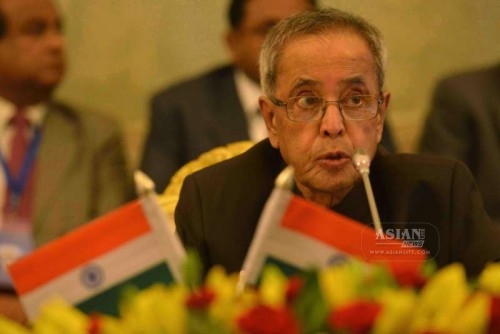
As President Pranab Mukherjee prepares to travel to Sweden on a three-day visit , a controversy has been triggered over his telling Sweden’s Dagens Nyheter daily that the Bofors gun issue was not a scandal but rather a “media trial”.
The Indian envoy in Sweden has directed the Swedish daily to edit the references to Bofors in the interview, which Dagens Nyheter refused.
Mukherjee is to visit Sweden on May 31-June 2 in the first ever presidential visit from India “for consolidation of bilateral ties”, said an official statement.
Ahead of the visit, Dagens Nyheter interviewed the president and put up the entire interview on its website.
According to the daily, “during the interview, the president commented on the Bofors affair, an incident that has plagued Swedish-Indian relations for a long time”.
“The president stated then that the Bofors wasn’t a scandal, but rather a media trial.
“‘I am not describing it. You are putting that word. Don’t put that word’, the president said to DN’s editor in chief Peter Wolodarski during the interview in the presidential palace,” the daily says on its website.
On Tuesday, Dagens Nyheter received an official letter from the Indian ambassador in Stockholm, Banashree Bose Harrison, where she conveys the “disappointment” of “authorities in Delhi over the manner in which your interview of the Honorable President has been presented in the Dagens Nyheter of May 24, 2015”.
The Indian envoy complained about the manner in which the Bofors question was represented on its website and said this was “all the more inexplicable since you told me that Bofors is not of interest to your readers”.
The Dagens Nyheter reproduced the ambassador’s complaint on its website.
It also said the envoy called up the paper to make a request to retract “sections of the interview mentioning Bofors” and also warned that the planned presidential visit “was at risk of being cancelled”.
“In a telephone conversation with DN prior to the publication of the article, the ambassador made a direct request that DN was to retract sections of the interview mentioning Bofors. She also warned that the planned state visit was at risk of being cancelled,” the paper says.
“I told the ambassador that we couldn’t accept her demands. The president became engaged and was upset when Bofors was mentioned during a question regarding how we can avoid corruption today. Of course we had to tell our readers about his reaction,” Wolodarski was quoted as saying.
“The reactions in Indian media show that his answers are of public interest, even more so in India than in Sweden.”
“At the end of the interview DN light heartedly mentioned the fact that the president mixed up Sweden and Switzerland several times. This was unprofessional and unethical by the newspaper,” according to the ambassador.
She also claimed that DN, by shortening a video interview from six minutes to three, misled the audience.
“I find the ambassador’s reaction regretful. It is surprising that someone representing the world’s largest democracies is trying to micromanage which questions we should ask a head of state, and which answers should be published,” Wolodarski was quoted as saying.
“DN published four pages in our Sunday edition, containing almost every answer from the Indian president. We have conducted the interview in the same manner as we do whenever we interview other heads of state and government,” it says.
The Bofors scandal, which rocked India in the 1980s, was over allegations that the Swedish arms manufacturer Bofors AB paid $640 million as kickbacks to secure a $1.3 billion contract to sell 155 mm field howitzers to the Indian Army.